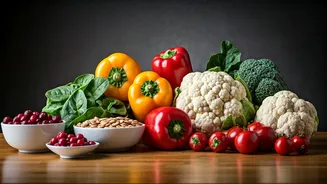Cabbage's Kidney Boost
Cabbage is a nutritional powerhouse that is frequently overlooked but can contribute significantly to kidney health. It is exceptionally low in potassium,
making it a good choice for those who need to limit their potassium intake due to kidney issues. Cabbage provides fiber, vitamin K, and vitamin C. Fiber aids in regulating blood sugar levels and promoting overall digestive health, which indirectly benefits the kidneys by reducing the workload. Vitamin K is crucial for blood clotting, and vitamin C is an antioxidant that protects the body from damage by free radicals. Incorporating cabbage into your diet is very simple. It can be eaten raw in salads, cooked as a side dish, or added to soups and stews. Whether you choose green, red, or Savoy cabbage, you are supplying your body with important nutrients to support kidney function.
Nutrient-Rich Bell Peppers
Bell peppers, available in various colors like red, yellow, and green, are another excellent addition to a kidney-friendly diet. They are low in potassium and offer an abundance of vitamins, particularly vitamin C, and antioxidants, which play a crucial role in protecting cells from damage. The antioxidants in bell peppers aid in reducing inflammation, a factor that can impact kidney health. Bell peppers are also a good source of vitamin A, which is essential for immune function. Vitamin B6 is present as well, which can help maintain healthy nerve function. Bell peppers are versatile and easy to prepare. They can be added to stir-fries, salads, or roasted as a side dish. By including bell peppers in your diet, you provide the kidneys with important nutrients that aid in their maintenance and overall health.
The Wonders of Cauliflower
Cauliflower, a cruciferous vegetable, is very beneficial for people seeking to support their kidney health. It is naturally low in potassium, making it a safe choice for those who need to restrict their potassium intake. Cauliflower is filled with vitamin C, vitamin K, and folate, which contributes to several aspects of overall health. Vitamin C acts as an antioxidant, combating cell damage, while vitamin K is essential for blood clotting and bone health. Folate is crucial for cell growth and development. Cauliflower provides fiber, which aids digestion and helps regulate blood sugar levels, reducing the burden on the kidneys. You can enjoy cauliflower raw, roasted, steamed, or pureed into a soup. Because of its adaptability, it is simple to incorporate into a well-balanced, kidney-supporting diet.
Onions: Flavor & Health
Onions are more than just a flavor enhancer; they are also packed with health benefits. Onions contain quercetin, an antioxidant that helps protect against cell damage and reduce the risk of chronic diseases. They are low in potassium and contain chromium, which may help the body metabolize fats, proteins, and carbohydrates. Onions are also a good source of fiber, which aids digestion and can help prevent constipation. You can easily add onions to meals by sautéing them, adding them to salads, or using them in soups and stews. Onions not only make your food taste better but also help to sustain kidney function by lowering inflammation and offering crucial nutrients.
Garlic's Powerful Benefits
Garlic is well-known for its medicinal properties and can provide many benefits for kidney health. Garlic contains allicin, a powerful compound known for its anti-inflammatory and antioxidant effects. Garlic can reduce inflammation and help protect the kidneys from damage. Although not high in potassium, the mineral content should be considered by people on strict potassium-restricted diets. Garlic can be added to various dishes, whether raw or cooked. Using it to flavor your meals not only gives them a unique taste but also supplies essential nutrients that support the kidneys' function and general well-being. Incorporating garlic into your diet is a simple and effective strategy for promoting overall health and kidney wellness.



















